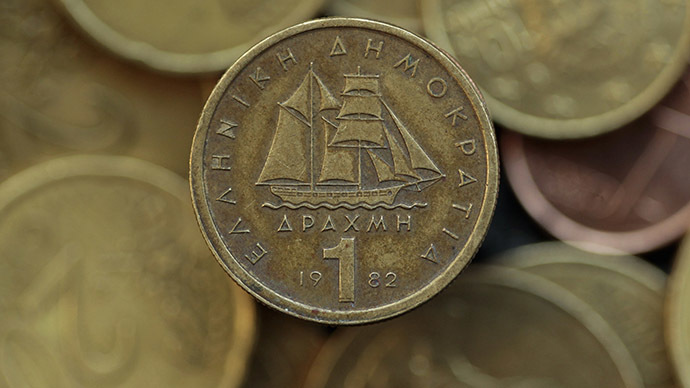Greece’s Syriza weaves scheme for default, return to national currency - media

A wing of Greece’s anti-austerity Syriza party is eyeing a plan to default on government debt and replace the euro with its own national currency in case negotiations on a bailout with its creditors fail, media have reported.
The plan envisions a default similar to the one implemented by Iceland during the 2008 financial crisis, along with the nationalization of the Greek banking system. The party faction considers the continuing negotiations with European creditors useless, The Telegraph reported Monday citing sources familiar with the matter.
It also foresees controlling capital movements and the establishment of a sovereign central bank to serve as a basis for a new financial system.
The introduction of a dual currency is possible, the source said, but would violate the terms of membership in the eurozone, which could mean a quick return to Greece’s previous currency, the drachma.
READ MORE: ‘Last attempt’ debt negotiations fail as Greece rejects more austerity
The initiative was put forward by 30 MPs from Syriza’s Left Platform, but some members of other factions, and even some MPs from the right-wing Independent Greeks party, which is also represented in the government, have also supported the idea.
“This goes well beyond the Left Platform. We are talking serious numbers,” said one Syriza MP involved in the draft.
“We are all horrified by the idea of surrender, and we will not allow ourselves to be throttled to death by European monetary union,” he told the Telegraph.
The authors of the draft take the scenario which unfolded in Iceland at the peak of the 2008 financial crisis as inspiration. At that time, Iceland nationalized three major banks, then defaulted, imposed a ban on the movement of capital abroad, and devalued its currency. Afterwards, the country’s economy markedly improved, and the government’s emergency measures received a positive assessment from the International Monetary Fund.
However, Iceland received financial assistance from the IMF and the Nordic countries at that time, but EU countries are currently refusing to provide further financial assistance to Greece unless it carries out painful economic and social reforms.
If the current Greek government, headed by Alexis Tsipras, accepts the terms demanded by its Troika of creditors (the EC, ECB and IMF), it will fail to fulfill its election promises to Greece’s people. The PM says he will not compromise on pension cuts, tax rises or targets for budget surplus in order to make interest payments.
READ MORE: ‘No progress’: IMF walks out of bailout talks with Greece
Meanwhile Athens is facing pressure from international lenders to pay 1.6 billion euros in interest to the IMF by the end June. If an agreement is not reached by June 30, Greece is set to lose the opportunity to receive rescue loans needed to make regular debt payments. This could, in turn, result in imminent default, followed by the country’s exit from the euro zone.
Talks between Greece and international creditors held in Brussels on June 13 and 14 brought no results. The European Commission noted that the gap between Greece’s proposals and the general requirements of the Troika continues to amount to about 2 billion euros in budget savings annually, which is about one half to one percent of Greek GDP.
Chairman of the ECB Mario Draghi said on Monday that they had done everything possible to reach a deal in the negotiations. He added that the next move towards reaching a compromise with international lenders must be made by Greece.
Since the Greek crisis broke out in 2010, the EU and IMF have provided loans to the country in the amount of nearly 250 billion euros. Despite a partial write-off of Greek debt in 2012, its public debt currently exceeds 315 billion euros, or 175% of the country’s GDP. This is three times the maximum permissible level for government debt in the eurozone, which shouldn’t exceed 60% of GDP, according to the Stability and Growth Pact.












